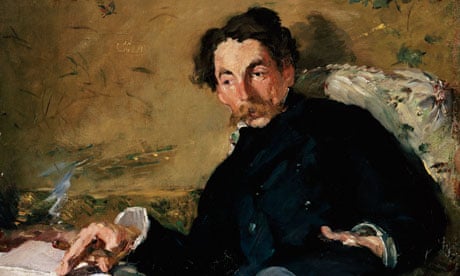"English and French are a single language," Wallace Stevens wrote in his "Adagia". While French poetry was a huge influence on English-language modernism, not all shared Stevens's belief in the closeness of the two tongues. Debating the issue with André Gide, St-John Perse deplored the concrete nature of English and its desire to "reincarnate the thing itself". In its abstract way French used words "like coins as values of monetary exchange", he felt, whereas English "was still at the swapping stage".
With his attachment to the play of consciousness over mere actuality, Mallarmé is as un-Anglo-Saxon as they come. As a result, he has tended to attract translators of an experimental bent, such as Brian Coffey and Cid Corman. More recently, Patrick McGuinness has produced a marvellous version of the elegy Mallarmé wrote for his dead son, "For Anatole's Tomb", and now with Peter Manson's The Poems in Verse we have a contemporary Mallarmé in extenso. It makes for one of the most exciting translations of recent years.
A Mallarmé poem is typically a soufflé of synaesthetic delights, served up to all five senses with the icy skill of a Paris head waiter, crying out for orchestration by Debussy and illustrations by Manet. It will tend to strike a mystical note, as though spoken by the priest of a non-existent religion addressing an equally non-existent god. It will resist the intelligence almost as successfully as poems can, to abuse another line from Wallace Stevens. And at its centre will be the void, the "rien" that is the first word of his oeuvre:
No thing, this foam, a virgin verse
to outline nothing but the cup;
as, far away, a siren troupe
is drowned, and mainly bottoms-up.
Seldom can a play have been less dramatic than Hérodiade, the major work of Mallarmé's early years (though like many of his grand projects, it remained unfinished). Heavily indebted to the Baudelaire of Correspondences, the poem conjures a landscape where nothing is ever itself, but passes through an endless chain of symbolist substitutions. Yet even as all is in a state of flux, something is missing. "Perfection is terrible, it cannot have children," wrote Sylvia Plath, and if Hérodiade seems deathless it is because she has never really been alive, a "Sad flower that grows alone and has no other emotion / than its shadow on the water seen listlessly".
Poems are not made out of ideas, they are made out of words, Mallarmé told Degas, but there is something chilling as well as gaudy and florid in his embrace of words alone. The omnipresent "azur" of his empty skies is a precursor of, among other things, Larkin's "deep blue air, that shows / Nothing". Jean-Paul Sartre makes an unlikely devotee of Mallarmé, but saluted the poet's "terrorisme de la politesse", his ability to cancel bourgeois reality by putting the world "en parenthèses". The sonnets for Poe, Baudelaire and Verlaine apply this apocalyptic vision with eerie precision, though for all the skill of his free-verse versions, Manson is unable to evict the chime of "death" with "breath" at the end of "Tombeau for Verlaine". As life shrinks to an "abolished bauble inanely echoing", something like the music of the spheres begins to resound in its place, amid unearthly and impossible complexities:
Here almost always if the ring dove coos
this immaterial mourning oppresses with many
nubile folds the future ripened star
whose scintillation will silverplate the crowd.
Yet even Mallarmé had his lighter side. The illustrations accompanying the "Chansons Bas" are a particular delight, as is these quatrains' reminder of the workaday side of Mallarmé's inspiration. As he writes in "The Roadmender": "You level these cobbles / and there is, as a troubadour, / a block of brains I too / must open up per day."
In his own translations Mallarmé spurned the convention of parallel texts, and Manson too fears imprisoning his originals in structures of false equivalence. In his afterword, he writes of the "interference-pattern" he has tried to set up between the French alexandrine and the English pentameter: the gaps and pauses between the two languages breath the meaning in and out across the pages. Where another key element, rhyme, is concerned, its very centrality to Mallarmé's aesthetic is what decided Manson against it. These are brave and austere choices, but there is no arguing with the results. Copious and intriguing notes or "scholia" explore "what I hope is a permissible minimum of pareidolia", as Manson puts it with a Mallarméan flourish.
Writing to Hans Naumann in 1954, Beckett punningly insisted on "le besoin d'être mal armé", his artistic need to be ill-equipped. We are, all of us, ill-equipped to solve the cosmic riddles framed by Mallarmé's work, but acts of sympathetic translation such as Manson's make the challenge ever so slightly easier. This is an exceptional translation, ranking alongside John Ashbery's Rimbaud, Mark Ford's Roussel, and Michael Hofmann's Durs Grünbein. But there remains work to be done: the poems in prose and Un coup de dés still await Manson's attentions. More, please.

Comments (…)
Sign in or create your Guardian account to join the discussion